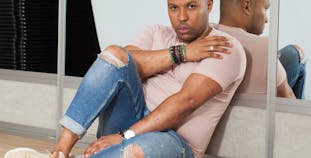Advance Online

Advance Online
No, It’s Not Contagious
A Dominican-American man with psoriasis fends off the usual annoying questions, battles his anger, searches for the right treatment and helps raise awareness.

A Dominican-American man with psoriasis fends off the usual annoying questions, battles his anger, searches for the right treatment and helps raise awareness.
We use cookies to offer you a better experience and analyze our site traffic. By continuing to use this website, you consent to the use of cookies in accordance with our Privacy Policy.